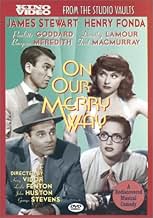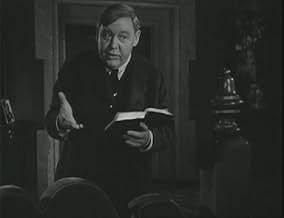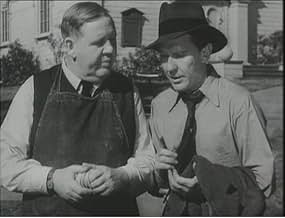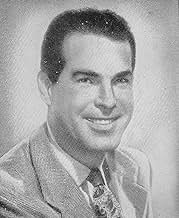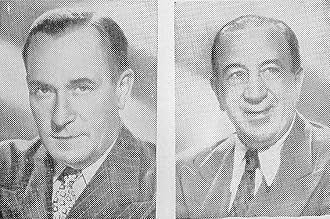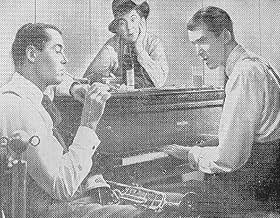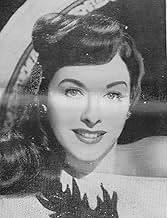NOTE IMDb
5,7/10
940
MA NOTE
Ajouter une intrigue dans votre langueThree short stories revolving around the topic of the daily question posed by the roving reporter to the readers of a daily newspaper.Three short stories revolving around the topic of the daily question posed by the roving reporter to the readers of a daily newspaper.Three short stories revolving around the topic of the daily question posed by the roving reporter to the readers of a daily newspaper.
Carl 'Alfalfa' Switzer
- Leopold 'Zoot' Wirtz
- (as Carl Switzer)
Avis à la une
And then just sinks into boredom.
Martha Pease (Paulette Goddard) demands that her husband Oliver (Burgess Meredith) tell the newspaper where he works as the "Roving Reporter" that he be allowed to pick his own subjects. She will know if he did that by reading the next edition's Rambling Reporter column and seeing that his idea - How has a small child influenced your life? - is the theme of the column.
After leaving his apartment that morning Oliver confesses to the audience that he is not the Roving Reporter. He is in fact just a classified ad clerk, but that he told his wife this lie before they were married and hasn't had the heart to tell her the truth ever since. As a result he has been lying about his salary and thus he is in peril of having his furniture repossessed and he owes gambling debts. This is all very interesting, but then it just bogs down. And that is hard to believe when one of the vignettes involving people on the street actually being interviewed includes James Stewart and Henry Fonda, good friends in real life, on screen together.
When I first sat down to watch this I wondered why I had never heard of this one. By the time it finished I knew the answer to that question. Avoid.
Martha Pease (Paulette Goddard) demands that her husband Oliver (Burgess Meredith) tell the newspaper where he works as the "Roving Reporter" that he be allowed to pick his own subjects. She will know if he did that by reading the next edition's Rambling Reporter column and seeing that his idea - How has a small child influenced your life? - is the theme of the column.
After leaving his apartment that morning Oliver confesses to the audience that he is not the Roving Reporter. He is in fact just a classified ad clerk, but that he told his wife this lie before they were married and hasn't had the heart to tell her the truth ever since. As a result he has been lying about his salary and thus he is in peril of having his furniture repossessed and he owes gambling debts. This is all very interesting, but then it just bogs down. And that is hard to believe when one of the vignettes involving people on the street actually being interviewed includes James Stewart and Henry Fonda, good friends in real life, on screen together.
When I first sat down to watch this I wondered why I had never heard of this one. By the time it finished I knew the answer to that question. Avoid.
Read someone else saying it was ridiculous, basically, but I thought since full of good actors in really strange rolls, it might be interesting. It was as if someones unprofessional relative was producing, directing it, and all of the actors went along with it just for fun? Or something? I am a big enough fan of old movies and great actors that I am willing to go along for the ride. I got further along this time, than the first time. I generally look into the actors bios as I watch an old movie that I am unfamiliar with. The young woman in the bathing suit, playing the trumpet, was 6'2", I looked her up, bc I thought she looked very tall. I actually laughed a few times throughout the thing, but would not recommend it to anyone. I am just a diehard old movie, great old actor fan.
Not the "rediscovered gem from the Golden Age of Cinema" as it is proclaimed on the Kino Video DVD case, but a curiosity nonetheless. It is an anthology movie with four different stories tied together by a young Burgess Meredith asking the question "How has a child influenced your life?" The most successful sequence (directed by the unbilled John Huston & George Stevens) involves James Stewart and Henry Fonda as a couple of down-on-their-luck musicians. Not only is it great to see these two real-life pals work together for the first time, but their chemistry & easy slapstick antics are quite funny. Seeing Henry Fonda playing the trumpet while gradually getting seasick, and taking Carl "Alfalfa" Switzer down with him, is worth the whole movie. I guess the copyright on O. Henry's "The Ransom of Red Chief" had expired as the Fred MacMurray, William Demerest sequence (years before they were teamed again on T.V.'s "My Three Sons") is a blatant and not very inspired rip-off.
Before I committed to buying the DVD of "On Our Merry Way," I got it from Netflix and happy I am that I did so, for it's not likely I'd ever want to watch it again. "On Our Merry Way" is an anthology film in the manner of "O. Henry's Full House," but while the latter has a no-nonsense framework with John Steinbeck introducing the episodes, "On Our Merry Way" uses the gimmick of Burgess Meredith talking directly to the camera every so often. It doesn't work; it seems more like a vanity project for Meredith and his then wife Paulette Goddard.
Nor do the stories work. They are shaggy dog stories that bore you long before they reach a conclusion. The Henry Fonda-James Stewart and Fred MacMurray-William Demarest episodes are simply not funny. "On Our Merry Way" is full of overacting (especially from Carl "Alfalfa" Switzer) and shtick (from Victor Moore and Hugh Herbert). Dorothy Lamour, on the other hand,comes off extremely well both as an addle-pated secretary and then with a song that satirizes her own career; for Lamour it's a triumph over inferior material.
John O'Hara is credited for one of the stories, O. Henry is not, even though his "The Ransom of Red Chief" serves as the basis for the MacMurray-Demarest episode; for comparison, watch the Fred Allen-Oscar Levant take on the same story in "O. Henry's Full House." It's only minimally better but it moves faster.
It's inconceivable to me that so many great directors, credited or un-, would produce such a mess.
One can't help be grateful to Kino for clearing the copyright problems which had long kept the film in limbo; after all, we do want to preserve the work of our great stars, no matter how bad. But once our curiosity is satisfied, "On Our Merry Way" becomes a shelve-it-and-forget-it film.
For a much better pairing of Meredith and Goddard, I'd recommend Jean Renoir's English-language version of "The Diary of a Chambermaid."
Nor do the stories work. They are shaggy dog stories that bore you long before they reach a conclusion. The Henry Fonda-James Stewart and Fred MacMurray-William Demarest episodes are simply not funny. "On Our Merry Way" is full of overacting (especially from Carl "Alfalfa" Switzer) and shtick (from Victor Moore and Hugh Herbert). Dorothy Lamour, on the other hand,comes off extremely well both as an addle-pated secretary and then with a song that satirizes her own career; for Lamour it's a triumph over inferior material.
John O'Hara is credited for one of the stories, O. Henry is not, even though his "The Ransom of Red Chief" serves as the basis for the MacMurray-Demarest episode; for comparison, watch the Fred Allen-Oscar Levant take on the same story in "O. Henry's Full House." It's only minimally better but it moves faster.
It's inconceivable to me that so many great directors, credited or un-, would produce such a mess.
One can't help be grateful to Kino for clearing the copyright problems which had long kept the film in limbo; after all, we do want to preserve the work of our great stars, no matter how bad. But once our curiosity is satisfied, "On Our Merry Way" becomes a shelve-it-and-forget-it film.
For a much better pairing of Meredith and Goddard, I'd recommend Jean Renoir's English-language version of "The Diary of a Chambermaid."
Down-on-his-luck newspaper ad-man, working the lost-and-found desk, creates a reporting opportunity for himself wherein he polls everyday citizens with an innocuous yet potentially interesting question, "What affect has a child had on your life?" (this is immediately rectified to 'baby' when posed to two jazz musicians). In the prologue, co-producer and star Burgess Meredith is awfully pushy trying to ingratiate himself to the audience; he and Paulette Goddard make for a curious married couple (to say the least), but they're not around enough to cause too much damage. Still, this overlong compendium involving stammering music-partners, a would-be movie actress, and two traveling showmen fails to touch upon anything personal or provocative. It is initially nice to see Henry Fonda and James Stewart sharing the screen, yet their comedic episode is silly and annoying. Production vales high, cast is game, but there are so few laughs that one may think the filmmakers were actually trying for something meaningful. Sadly, there is no substance or depth on display. *1/2 from ****
Le saviez-vous
- Anecdotes"A Miracle Can Happen" was the original title of this film when released on Feb. 3, 1948 at the Warner Theater in Manhattan. It consisted of three short stories (about 20-25 minutes each) linked by the Burgess Meredith character. He played a reporter looking for a good scoop, and in the second sequence, Charles Laughton played a bible-reading minister. When it was released nationally in June, however, it had been decided that the religious story would be dropped and replaced by a more comic one featuring Dorothy Lamour. The film in this new version was then re-titled "On Our Merry Way". However, prints of the original film had already been sent abroad for dubbing. In Spain, "A Miracle Can Happen" became "Una Encuesta Llamada Milagro", complete with the original Laughton sequence intact (but without the alternative Lamour story). As it has been released on DVD there and retains the English-language soundtrack, the movie can be seen as it was originally intended.
- Versions alternativesThe version released in Spain and always seen on both TV and DVD, in dubbed and subtitled versions (bearing the title card "A Miracle Can Happen"), includes the Charles Laughton episode but not the Dorothy Lamour one.
- ConnexionsFeatured in Henry Fonda: The Man and His Movies (1982)
Meilleurs choix
Connectez-vous pour évaluer et suivre la liste de favoris afin de recevoir des recommandations personnalisées
- How long is On Our Merry Way?Alimenté par Alexa
Détails
- Durée
- 1h 47min(107 min)
- Couleur
- Rapport de forme
- 1.37 : 1
Contribuer à cette page
Suggérer une modification ou ajouter du contenu manquant

